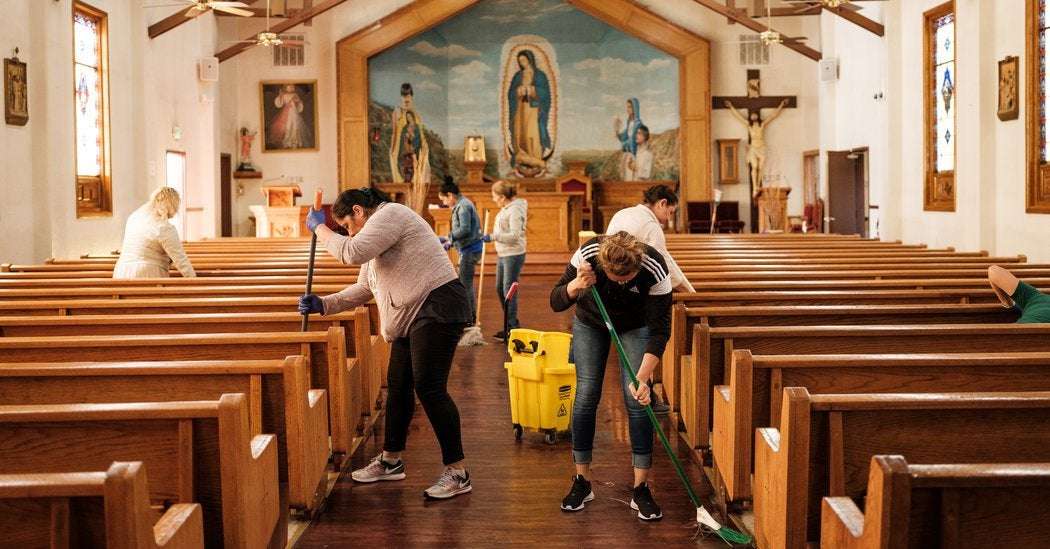How can I protect myself while flying?
If air travel is unavoidable, there are some steps you can take to protect yourself. Most important: Wash your hands often, and stop touching your face. If possible, choose a window seat. A study from Emory University found that during flu season, the safest place to sit on a plane is by a window, as people sitting in window seats had less contact with potentially sick people. Disinfect hard surfaces. When you get to your seat and your hands are clean, use disinfecting wipes to clean the hard surfaces at your seat like the head and arm rest, the seatbelt buckle, the remote, screen, seat back pocket and the tray table. If the seat is hard and nonporous or leather or pleather, you can wipe that down, too. (Using wipes on upholstered seats could lead to a wet seat and spreading of germs rather than killing them.)

Incromulent on May 30th, 2020 at 13:54 UTC »
While I'm pleased with the outcome, it's scary that 4 of 9 highest judges in the country either don't understand public health and science or put their faith or politics above those.
SanderAtlas on May 30th, 2020 at 13:40 UTC »
If churches want to be treated as an equal business they can start paying taxes.
mnorthwood13 on May 30th, 2020 at 13:25 UTC »
WASHINGTON — The Supreme Court on Friday turned away a request from a church in California to block enforcement of state restrictions on attendance at religious services.
The vote was 5 to 4, with Chief Justice John G. Roberts Jr. joining the court’s four-member liberal wing to form a majority.
“Although California’s guidelines place restrictions on places of worship, those restrictions appear consistent with the free exercise clause of the First Amendment,” Chief Justice Roberts wrote in an opinion concurring in the unsigned ruling.
“Similar or more severe restrictions apply to comparable secular gatherings, including lectures, concerts, movie showings, spectator sports and theatrical performances, where large groups of people gather in close proximity for extended periods of time,” the chief justice wrote. “And the order exempts or treats more leniently only dissimilar activities, such as operating grocery stores, banks and laundromats, in which people neither congregate in large groups nor remain in close proximity for extended periods.”
Justices Clarence Thomas, Samuel A. Alito Jr., Neil M. Gorsuch and Brett M. Kavanaugh noted dissents.
“The church and its congregants simply want to be treated equally to comparable secular businesses,” Justice Kavanaugh wrote in a dissenting opinion joined by Justices Thomas and Gorsuch. “California already trusts its residents and any number of businesses to adhere to proper social distancing and hygiene practices.”
“The state cannot,” Justice Kavanaugh wrote, quoting from an appeals court decision in a different case, “‘assume the worst when people go to worship but assume the best when people go to work or go about the rest of their daily lives in permitted social settings.’”
The court’s ruling was its first attempt to balance the public health crisis against the Constitution’s protection of religious freedom. And it expanded the Supreme Court’s engagement with the consequences of the coronavirus pandemic, after rulings on voting in Wisconsin and prisons in Texas and Ohio.
The case was brought by the South Bay United Pentecostal Church in Chula Vista, Calif., which said Gov. Gavin Newsom, a Democrat, had lost sight of the special status of religion in the constitutional structure.
“The Covid-19 pandemic is a national tragedy,” lawyers for the church wrote in their Supreme Court brief, “but it would be equally tragic if the federal judiciary allowed the ‘fog of war’ to act as an excuse for violating fundamental constitutional rights.”
The brief, filed May 23, asked the justices to block a ruling the day before from a divided three-judge panel of the United States Court of Appeals for the Ninth Circuit, in San Francisco, saying that the shutdown orders did not single out houses of worship for unfavorable treatment. The majority said state officials had struck an appropriate balance.
“We’re dealing here with a highly contagious and often fatal disease for which there presently is no known cure,” the majority wrote in an unsigned opinion that went on to quote a famous dissent from a 1947 Supreme Court decision. “In the words of Justice Robert Jackson, if a ‘court does not temper its doctrinaire logic with a little practical wisdom, it will convert the constitutional Bill of Rights into a suicide pact.’”
In dissent, Judge Daniel P. Collins wrote that California had failed “to honor its constitutional duty to accommodate a critical element of the free exercise of religion — public worship.”
“I do not doubt the importance of the public health objectives that the state puts forth,” Judge Collins wrote, “but the state can accomplish those objectives without resorting to its current inflexible and overbroad ban on religious services.”
The appeals court ruled on May 22. That same day, President Trump made remarks on the subject at a news briefing.